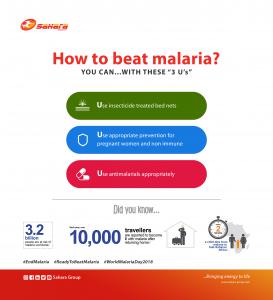
How do You Solve a Problem like Malaria?
Sahara Group is proud to present the “Sahara Group Editorial” (SAGE), an opinion style editorial designed to showcase our thought leadership.
LAGOS, LAGOS, NIGERIA, April 27, 2018 /EINPresswire.com/ -- Sahara Group is proud to present the “Sahara Group Editorial” (SAGE), an opinion style editorial designed to showcase our thought leadership and utilize our agency and influence for the purpose of enlightenment, entertainment and sparking a good debate. The first editorial is focused on Malaria:
How do You Solve a Problem like Malaria?
Africa, by sheer stroke of continental plate shifts and proximity to the equator, continues to grapple with the malaria scourge; a harbinger of death which according to UNICEF kills one child every 30 seconds, about 3000 children every day.
The word malaria actually has its origins in mid-18th century Italian (even though its symptoms were being detected in Ancient China almost 3,000 years BCE). Mala, meaning ‘bad’ and ‘aria’ meaning air were conjoined to form one word as the disease was incorrectly linked to being caused by inhaling and exhaling putrid air in swampy, tropical environments.
Studies on the disease have come a very long way since then, even though according to the WHO, the African region which is largely tropical and plagued by air pollution in most of its urban clusters continues to carry a disproportionately high share of the global malaria burden.
In 2016, the African region accounted for 90% of malaria cases and 91% of deaths thereof.
This puts the fight against malaria in a rather unique yet devastating position. If Africa can eradicate malaria completely, the scourge of the disease would effectively be vanquished the world over. On the other hand, a 90% death burden is too heavy a cross for any singular region to bear both in humanitarian and economic terms.
The plight of malaria victims in Africa has remained largely unchanged in over a hundred years. Despite the advancements in prevention and management of the disease, millions continue to fall sick or die in Africa whilst it has been virtually eliminated in other parts of the world including neighboring North Africa and the Middle East.
The majority of malaria infections in Africa are caused by Plasmodium Falciparum which is the most dangerous of the four human malaria parasites. The population of said parasite also happens to be disproportionately skewed towards the sub-Saharan African region.
According to The Against Malaria Foundation report compiled in 2010, up to 40% of all outpatient visits to clinics and hospitals in sub-Saharan Africa are for malaria diagnosis and treatment.
Treatment of the disease is often hampered by a delay in reporting symptoms, misdiagnosis, and the unavailability of necessary drugs.
The situation is exacerbated by the swathes of sub-Saharan Africans who live below the poverty line-the worst victims being children. Studies have shown that Under-5 (years of age) mortality rates spike amongst the children who come from the lowest socio-economic groups.
Poor families due to ignorance, the lack of wherewithal or a combination of both often do not protect themselves with insecticide-treated nets, or readily accessible preventative medicine.
Malaria may not always be given top priority when health-related policies are shaped and budgets are drawn because It is not considered a chronic disease. Despite glaring WHO facts and figures to the contrary, it isn’t necessarily considered a cause of deathly concern either because Africans have a genetic resistance to malaria which means our bodies can combat the disease with an arsenal which simply isn’t available to our Caucasian cousins.
This circles back to the matter of socio-economic status and how success rates in fighting malaria are usually commensurate with an upper ranking in the social-economic pyramid.
The people with a supposedly “higher resistance” to the malaria parasite tend to reside in brick and mortar homes with indoor plumbing. They usually have white collar jobs and tertiary level educations.
The future success of malaria may not necessarily lie in our readiness to beat it. Rather, it hinges on how successfully it can be managed in the region it has blighted the most-sub Saharan Africa.
Unless literal seismic changes occur within our natural environment, it is far-fetched to expect that malaria can be eradicated in the medium to long-term in the way smallpox was almost forty years ago.
Efforts should be galvanized towards eliminating child mortality rates and ensuring that proven methods of prevention and management such as the proliferation of insecticide scented nets in low-income communities are given all the institutional and systemic impetus they need to be efficient.
In the last four years, the WHO reports that investments in malaria control have been decreasing. After a significant reduction in malaria infection numbers in 2010, the WHO reported that infection levels spiked by 5m between 2015 and 2016.
A lack of capital is possibly the greatest threat to the management of malaria and our ability to save lives via concerted inter-regional efforts.
If a cash crunch is reversing what was previously great progress, we can take comfort in knowing that we have expeditiously and succinctly identified the problem. Our next challenge is to double down on fundraising efforts with clarity, focus, and speed.
A generous and sustainable eco-system of finance may just mean that malaria eradication can be discussed as something within the realm of an indigent sub-Saharan African child’s lifetime and reality.
For more information on how you can how “Beat Malaria” or if you would simply like to gain more knowledge on the subject, please go to http://www.who.int/campaigns/malaria-day/2018/event/en/
Bethel Obioma
Sahara Group
+234-1-2793811
email us here
EIN Presswire does not exercise editorial control over third-party content provided, uploaded, published, or distributed by users of EIN Presswire. We are a distributor, not a publisher, of 3rd party content. Such content may contain the views, opinions, statements, offers, and other material of the respective users, suppliers, participants, or authors.



